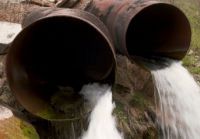

In the past year, for environmental offences alone over £18.1 million was paid in financial penalties.
Ofwat, the water regulator for England and Wales, is considering cutting fines for sewage-dumping water companies if they are facing financial pressures.
Thames Water received the biggest financial penalty in 2023 of £3.5 million after a 2017 incident saw millions of litres of raw sewage flood into two rivers near Gatwick Airport.
The Environment Agency discovered 1,400 dead fish after the incident, but the court heard this was “a fraction of the number” the regulator believes would have been killed.
As a result of this high penalty, Thames Water is facing collapse or restructuring. This has led the regulator to draw up a "recovery regime" for Thames Water and others that find themselves in similar positions according to the Financial Times.
Under the proposals, the companies could face fewer or no fines for water outages and sewage leaks and instead be encouraged to invest in infrastructure, in an effort to reduce the threat of nationalisation. Other debt-laden water companies, including Southern Water, South East Water and Yorkshire Water, may also be eligible for the recovery regime.
In April South West Water received the third biggest penalty of 2023 as they had to pay out £2,150,000 after a series of permit breaches and illegal discharges saw sewage, harmful chemicals and bacteria flood protected areas, public waterways and beaches.
The offences took place between July 2016 and August 2020. One incident saw an illegal discharge from the Watergate Bay sewage pumping station in August 2016, which lasted more than 35 hours.
Yorkshire Water received a £1 million penalty in 2023 as a result of an enforcement undertaking (EU) agreed with them by the Environment Agency.
It agreed to pay £500,000 to the Yorkshire Wildlife Trust and £500,000 to Yorkshire Dales Rivers Trust, after one of its storm overflows discharged into the Hookstone Beck in Yorkshire. The incident saw 1,500 fish killed in Yorkshire, marking the largest ever enforcement undertaking accepted by the Environment Agency.
The water industry has been requesting such measures for a while, with sources briefing ministers and journalists that fining companies such as Thames Water over sewage spills is like “shooting the company in the leg and then expecting them to win the race”. Their argument is that the large penalties make it harder to invest in remedying the situation.
Utilities would be given lower targets for reducing sewage and water leaks and outages in the plans seen by the FT and in exchange, they would receive more regulatory oversight for a period of up to five years.
Ofwat is receiving opposition from some parties. Labour is looking at plans to reform the regulatory system that could involve reshaping Ofwat, while the Liberal Democrats are calling for it to be scrapped and replaced with a stronger body.
The Lib Dem environment spokesperson, Tim Farron, said: “Any attempt to let these polluting giants off the hook would be an utter disgrace. This plan is proof Ofwat should be scrapped. This Conservative government has allowed this toothless regulator to stagger on too long. It is time someone finally stood up to these water firms.”
MPs including Labour’s Clive Lewis and John McDonnell have been pushing for a nationalisation of all water companies, starting with Thames Water. This is not Labour policy, but Thames Water may have to be temporarily nationalised if it fails.
Ofwat also has new powers to act against any water company that provides poor customer service in breach of a new licence condition, which could allow them to impose fines of up to 10% of the company’s turnover.
Although, there are examples of water and wastewater companies and their staff providing exceptional customer service across England and Wales, Ofwat is concerned there are still too many instances where customers feel let down, and that their water company does not have customers’ best interests at heart.
Recent figures published in Ofwat’s annual Water Company Performance Report, show that in 2022-23 there was a fall in customer satisfaction across most companies. This follows a decline in scores in 2021-22, and customer satisfaction is lower for all companies than it was in 2020-21.
As a result, Ofwat has now added to its regulatory tools to strengthen and enforce customer protection.